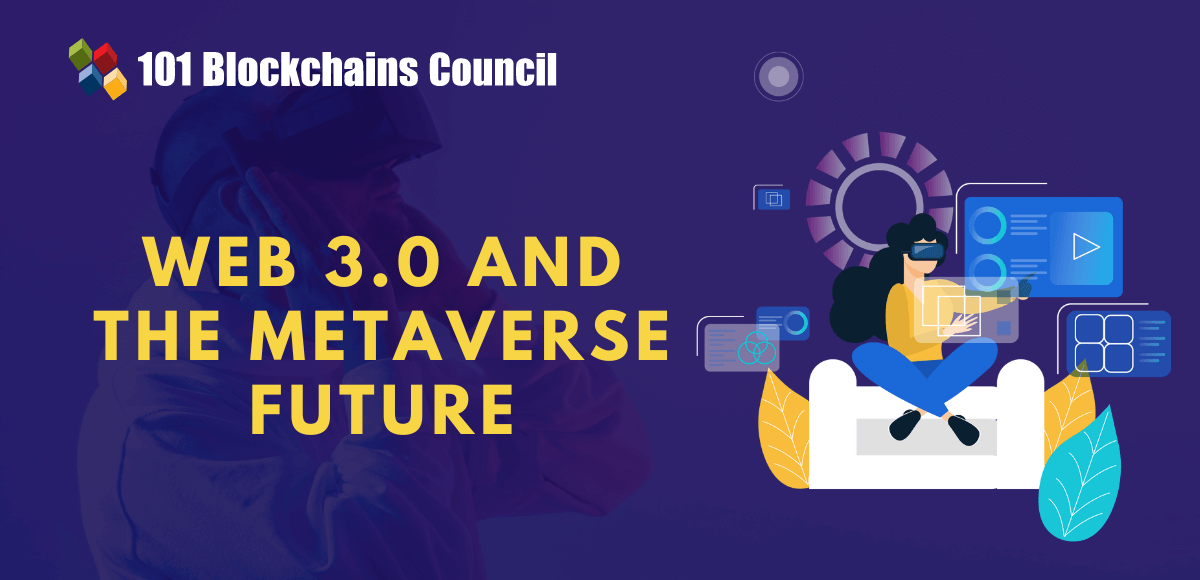The sheer volume of digital services, experiences, and assets moving around us might be invisible right now. However, it is also important to know how effectively we can control the assets and content we create online. The discussions about the future of web 3.0 and the metaverse have drawn a prolific picture about approaching the decentralized web. Why does anyone need the decentralized web? Let us take a look at one of the most common applications you use every day, such as social media apps.
Do you think that the content you post on Facebook is under your control and ownership? The answer would draw attention to how big companies establish their control over your data and use it for monetization. Therefore, the decentralized web or web3 is an inevitable evolution in the growth of internet services.
While web3 implies the future of the internet, it is also important to find out reasons to look for the future of the metaverse and what it might entail. The metaverse provides an essential foundation for merging virtual worlds or different online spaces. Metaverse would facilitate the integration of the internet in all aspects of everyday lives while enabling better scope for interacting with it. The following discussion aims to find out how web3 and metaverse will intertwine in the future.
The Journey to Web3 and Metaverse
The insights on the future of web3 should also emphasize how it evolved in the first place. With the arrival of the internet, communication became easier with reduced distance alongside connecting every individual and device. The internet also enabled an effective foundation for facilitating significantly high volumes of information flow. Over the course of recent decades, the internet has played a vital role in reshaping the modern world with significant milestones of change. At the same time, the growth of the internet has pointed out the necessity of dealing with different challenges emerging with the digital transformation of communication.
Most of the discussions about the web3 future emerge from the challenges evident in the existing tech landscape. First of all, standardization and interoperability throughout different services and systems have emerged as prominent requirements in present times. The internet needs more coherency, with markets becoming more fragmented. At the same time, the web needs to become more intuitive alongside enabling a seamless user interface. Most important of all, the internet must foster governance which can support effective regulation of content and experiences while encouraging progress. The assurance of smart cooperation and governance on behalf of providers and regulators could help in resolving the challenges with the web.
Curious to know whether web 3.0 will play an important part in the future of the internet? Check the detailed guide Now on The Insane Future Of Web3
How Do Web3 and Metaverse Matter Now?
The responses to “Is the metaverse the future of the internet?” create doubts regarding the definition of web3 and the metaverse. It is important to note that web3 is the future of the internet. Both web3 and metaverse help in moving into a world that could blend the difference between physical and virtual spaces. It would need more integration alongside better standards and protocols with a modern perspective. On top of it, web3 and metaverse would require new capabilities that offer better control to people over digital identities. Apart from digital identities, web3 and metaverse can offer better control to users over the assets of their own and the data created by them.
The use of standardized protocols and devices for interaction with digital experiences on the web has been gaining profound attention. With the help of web3, users can achieve better consistency and interoperability throughout different metaverse experiences. As a result, the answers to “How is Web 3.0 used in the metaverse?” would draw attention toward the combination of disparate and disconnected metaverse spaces into one coherent platform. Just like the internet, the big metaverse powered by web3 could have walled gardens as well as open commons alongside many creative solutions. The solutions should be accessible through browsers, AR glasses, VR headsets, mobile apps, and many others.
Are Web3 and Metaverse Really Reliable?
The promising value advantages associated with web3 and metaverse, alongside the synchronization between them, can prove their potential. However, web3 and metaverse have also been subjected to criticism. Therefore, the metaverse future and long-term prospects for web3 depend on how leaders can find their way through the noise surrounding web3. If leaders miss out on the opportunities, the whole industry could go through a radical transformation. The new wave of web3 and metaverse disruptors have created the possibilities for a fundamental-level movement that could affect the future of the internet. In the new future of the internet, web3 and metaverse could challenge the web2 business models directly.
Both the web3 and metaverse could introduce revolutionary advancements alongside technological innovations to ensure new approaches to communication, community formation, innovation, and prototyping. The future of web 3.0 and the metaverse could drive new waves of change which can create new worlds for the future. Businesses could navigate the innovative functionalities of the new future worlds and collaborate to develop the foundations of these worlds.
Want to get an in-depth understanding of metaverse concepts? Become a member and get free access to Metaverse Fundamentals Course Now!
Is the Metaverse the Same as Web3?
The early days of the internet pointed out the assumption that the web would evolve and transform with new conditions. With the new approaches to accessing the web, users could find new ways to communicate with each other, work together and enjoy games. The internet we use today has enabled all these functionalities, albeit with various negative implications. The impact of data breaches and the cases of interference with elections have proved that the internet is not a safe place. As the concept of creating a new internet with decentralized and democratic foundations gained momentum, people started thinking about web3 and the metaverse. On top of it, many people assumed that the web3 and metaverse are interchangeable terms.
The future of the metaverse might offer a congregation of different virtual worlds where users can participate seamlessly. However, people can confuse it with the definition of web3 or the internet, which enables access to decentralized and interoperable experiences. Therefore, it is important to understand that web3 and metaverse are different before you can think about their future.
The question of “How is Web 3.0 used in metaverse?” serves as a prolific answer for doubts about similarities between web3 and metaverse. Web3 is the next generation of the internet after web2, the version of the internet we use today. The primary foundations of web3 focus on the philosophy of establishing the internet as a decentralized computer network rather than using centralized servers. As a result, it can help in avoiding a single point of failure. On top of it, you don’t have a central authority in control of the information flow.
On the other hand, blogs and articles about the metaverse future would draw attention to the similarities drawn with web3. However, the metaverse is not web3 as it represents a virtual reality-based counterpart of the internet. Users could use VR and AR devices to interact with digital spaces and other users in immersive, three-dimensional environments. You can think of the metaverse as an extension of the internet in a three-dimensional virtual world. The metaverse serves as an immersive and interactive social platform that allows people to create avatars to represent their identity. In addition, metaverse users could also purchase and sell parcels of virtual land alongside real-time interactions with other users. On the other side of the spectrum, web3 offers more emphasis on blockchain technology and concepts such as smart contracts, decentralized applications, and digital identity.
Build your identity as a certified blockchain expert with 101 Blockchains’ Blockchain Certifications designed to provide enhanced career prospects.
Projects in Web3 and Metaverse
The easiest way to learn more about web3 future would focus on the different projects in the space. Web3 points out the possibilities of introducing a better version of the internet. Over the course of time, ownership of online content and user control over digital assets and identities would evolve. As of now, centralization is the norm in product and service development alongside delivery processes followed by different businesses. How has web3 influenced the new wave of internet-based solutions?
The future of web3 would rely profoundly on how web3 has earned traction in the existing web landscape. Here are the prominent examples of how web3 has established the foundations of transforming the internet.
- The transition from AWS storage to IPFS.
- Preferences for DAOs over LLCs for business development.
- Users are switching their financial assets from bank accounts to Metamask and other crypto wallets.
- Centralized systems have been giving way to blockchain-based systems.
- Decentralized social media apps such as Steemit have started taking the place of popular platforms such as Facebook.
- Decentralized web browsers such as Brave have been offering better incentives and secure user experiences than Chrome.
The advancements in web3 have also been evident in the rise of NFTs, play-to-earn games, and the profound growth of DAOs.
The responses to “How is Web 3.0 used in metaverse?” would also emphasize the popular examples of metaverse projects. One of the best examples for showcasing the prominence of metaverse projects would refer to Meta. Facebook has shifted its attention towards the creation of a seamless virtual world where users can access all the applications in the purview of Meta, such as Instagram and WhatsApp. As of now, the Meta project wants to build an online space where users can meet and interact with each other. A similar example is evident in the case of Microsoft Metaverse, which aims to offer a metaverse for empowering professional collaboration opportunities. The discussions about the future of web 3.0 and the metaverse also bring popular and working solutions, such as Decentraland, which have been actively drawing the attention of users.
How Web3 and Metaverse Build the Future?
The basic definition of web3 and metaverse show that they can complement each other in the future. First of all, you must understand that a metaverse without any central entity controlling the user data and assets can provide the true value benefits of decentralization and transparency. However, most of the metaverse platforms you notice today would show that most of them are owned by specific companies.
The future of web 3.0 and the metaverse would rely on how web3 enables decentralization in the metaverse spaces. Since the metaverse envisions the bridging of gaps between physical and virtual worlds, you need an open-source and interoperable public chain for facilitating interlinking between different worlds.
Learn about the fundamentals, key elements and business opportunities of the metaverse technology through this Metaverse E-book: An Introduction To Metaverse
Bottom Line
The vision for the future of web 3.0 and the role of the metaverse in web3 are completely different entities. Web3 refers to a set of principles and rules which dictate how a decentralized web must look and work. On the other hand, the metaverse is an example of one of the web3 technologies. Metaverse is a digital immersive 3D environment for accessing different online services. Therefore, immersive experiences in the metaverse could offer better traction for the use of web3 technology. At the same time, web3 could also offer better decentralization and openness in the metaverse. In a way, you can notice that web3 and metaverse would be intertwined in more ways than you can imagine. Learn more about web3 and metaverse in detail and become a certified expert in these domains.
*Disclaimer: The article should not be taken as, and is not intended to provide any investment advice. Claims made in this article do not constitute investment advice and should not be taken as such. 101 Blockchains shall not be responsible for any loss sustained by any person who relies on this article. Do your own research!











